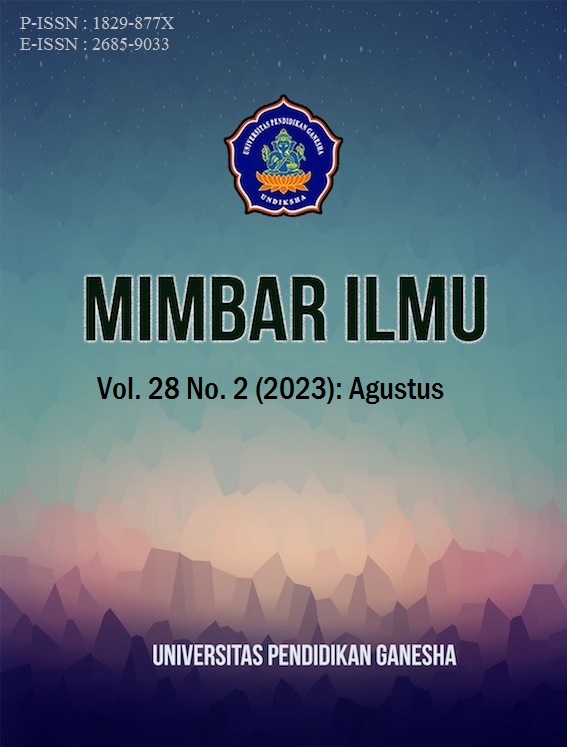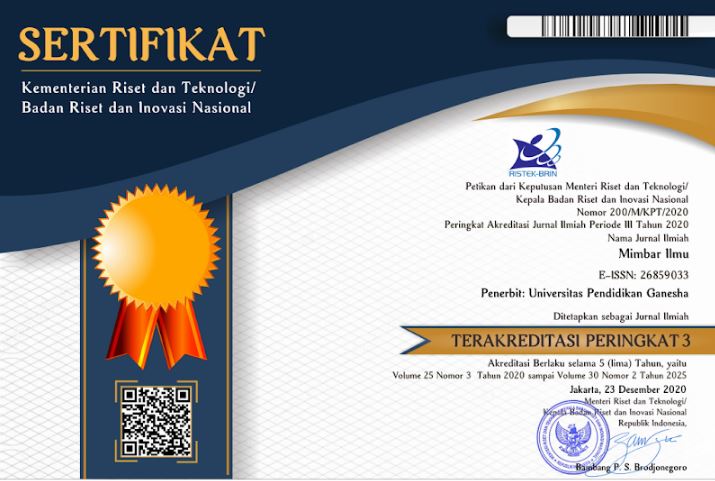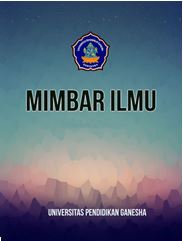Strengthening Discipline Character Value of Students During The Covid-19 Pandemic
DOI:
https://doi.org/10.23887/mi.v28i2.52734Kata Kunci:
COVID 19, Character value, DisciplineAbstrak
There are problems encountered in this study, namely in cultivating student discipline character values, including limited interaction, differences in students' ability to control emotions, an environment that is not conducive, limited learning facilities, and parental assistance that still needs to be improved. This study aimed to analyze efforts to instill the disciplinary character values of fourth-grade elementary school students during the COVID-19 pandemic. This study uses a descriptive qualitative research method. The subjects of this study were 23 people, including 3 class teachers, 3 student guardians, and 17 fourth-grade elementary school students. Data collection techniques are used in the form of observation, interviews, and documentation. The data analysis techniques performed were data reduction, presentation, and inference. The results of this study are that students can manage their study time at home well, study diligently and regularly, pay good attention while studying in class, and be orderly during the learning process in class, which is manifested by the efforts made by teachers and parents by habituating, mentoring, and reinforcement.
Referensi
Abendroth, A. K., & den Dulk, L. (2011). Support for the work-life balance in europe: The impact of state, workplace and family support on work-life balance satisfaction. Work, Employment and Society, 25(2), 234–256. https://doi.org/10.1177/0950017011398892. DOI: https://doi.org/10.1177/0950017011398892
Aditya Dharma, I. M. (2019). Pengembangan Buku Cerita Anak Bergambar Dengan Insersi Budaya Lokal Bali Terhadap Minat Baca Dan Sikap Siswa Kelas V Sd Kurikulum 2013. Journal for Lesson and Learning Studies, 2(1), 53–63. https://doi.org/10.23887/jlls.v2i1.17321. DOI: https://doi.org/10.23887/jlls.v2i1.17321
Aditya, I. K. D., Sumantri, M., & Astawan, I. G. (2019). Pengaruh Model Pembelajaran Learning Cycle (5e) Berbasis Kearifan Lokal Terhadap Sikap Disiplin Belajar Dan Hasil Belajar Ipa Siswa Kelas Iv Sd Gugus V Kecamatan Sukasada. Jurnal Pendidikan Multikultural Indonesia, 2(1). https://doi.org/10.23887/jpmu.v2i1.20792. DOI: https://doi.org/10.23887/jpmu.v2i1.20792
Aisyah, S., & Kurniawan, M. A. (2021). Penggunaan Media Pembelajaran Daring pada Masa Pandemi COVID-19. Jurnal Riset Madrasah Ibtidaiyah (JURMIA), 1(1), 48–56. https://doi.org/10.32665/jurmia.v1i1.195. DOI: https://doi.org/10.32665/jurmia.v1i1.195
Anggraini, Y., Patmanthara, S., & Purnomo, P. (2018). Pengaruh Lingkungan Belajar Dan Disiplin Belajar Terhadap Hasil Belajar Kompetensi Keahlian Elektronika Industri Di Sekolah Menengah Kejuruan. Jurnal Pendidikan : Teori , Penelitian dan Pengembangan, 2(12). https://doi.org/10.17977/jptpp.v2i12.10316.
Ariyani, D. (2021). Principal’s Innovation and Entrepreneurial Leadership to Establish a Positive Learning Environment. European Journal of Educational Research, 10(1), 63–74. https://doi.org/10.12973/eu-jer.10.1.63. DOI: https://doi.org/10.12973/eu-jer.10.1.63
Asih, P., & Sunarso, A. (2020). Implementation of Character Education to Improve the Students Discipline Through Habituation of Nadzam Asmaul Husna Recitation at Grade IV. Elementary School Teacher, 3(1). https://doi.org/10.15294/est.v3i1.28035. DOI: https://doi.org/10.15294/est.v3i1.28035
Birhan, W., Shiferaw, G., Amsalu, A., Tamiru, M., & Tiruye, H. (2021). Exploring the context of teaching character education to children in preprimary and primary schools. Social Sciences & Humanities Open, 4(1). https://doi.org/10.1016/j.ssaho.2021.100171. DOI: https://doi.org/10.1016/j.ssaho.2021.100171
Buchanan, J., Pressick-Kilborn, K., & Maher, D. (2019). Promoting environmental education for primary school-aged students using digital technologies. Eurasia Journal of Mathematics, Science and Technology Education, 15(2). https://doi.org/10.29333/ejmste/100639. DOI: https://doi.org/10.29333/ejmste/100639
Chan, F., Kurniawan, A. R., Melinda, L. G., Priantini, R., Zubaedah, Z., Suharti, S. R., & Khodijah, S. (2020). Implementasi Pendidikan Karakter Disiplin Pada Peserta Didik Di Sd Negeri 187/1 Teratai. PENDAS MAHAKAM: Jurnal Pendidikan Dasar, 4(2), 137–145. https://doi.org/10.24903/pm.v4i2.405. DOI: https://doi.org/10.24903/pm.v4i2.405
Dewi, C. (2017). Peningkatan Keterampilan Berbicara Dalam Bermain Drama Melalui Model Pembelajaran Kooperatif Tipe Inside-Outside Circle. Jurnal Inovasi Pembelajaran, 3(2). https://doi.org/https://doi.org/10.22219/jinop.v3i2.4575. DOI: https://doi.org/10.22219/jinop.v3i2.4575
Dewi, I. D. K. E., Suarni, N. K., & Magta, M. (2016). Penerapan Teknik Modeling Untuk Meningkatkan Disiplin Pada Anak Usia 5-6 Tahun Semester I Di Tk 17 Agustus Desa Bungkulan. Jurnal Pendidikan Anak Usia Dini Undiksha, 4(3). https://doi.org/10.23887/paud.v4i3.8835.
Diana, R. R., Chirzin, M., Bashori, K., Suud, F. M., & Khairunnisa, N. Z. (2021). Parental Engagement on Children Character Education: The Influences of Positive Parenting and Agreeableness Mediated by Religiosity. Jurnal Cakrawala Pendidikan, 40(2). https://doi.org/10.21831/cp.v40i2.39477. DOI: https://doi.org/10.21831/cp.v40i2.39477
Dilvina, S., Witono, A. H., & Safruddin, S. (2021). Analysis of Low Student Achievement in Fifth Grade of Elementary School. Prisma Sains : Jurnal Pengkajian Ilmu dan Pembelajaran Matematika dan IPA IKIP Mataram, 9(2), 168. https://doi.org/10.33394/j-ps.v9i2.4150. DOI: https://doi.org/10.33394/j-ps.v9i2.4150
Febrianty, D., & Cendana, W. (2021). Exemplary Teachers in Instilling Discipline for Elementary School Students through Online Learning. Musamus Journal of Primary Education, April, 81–89. https://doi.org/10.35724/musjpe.v3i2.3302. DOI: https://doi.org/10.35724/musjpe.v3i2.3302
Fefer, S. A., & Gordon, K. (2020). Exploring perceptions of school climate among secondary students with varying discipline infractions. International Journal of School and Educational Psychology, 8(3), 174–183. https://doi.org/10.1080/21683603.2018.1541033. DOI: https://doi.org/10.1080/21683603.2018.1541033
Fradila, N., & Dahlan, Z. (2023). Construction of Discipline of Madrasah Ibtidaiyah Students in PPKn Subjects. Indonesian Values and Character Education Journal, 6(1). https://doi.org/10.23887/ivcej.v6i1.59926. DOI: https://doi.org/10.23887/ivcej.v6i1.59926
Giarno. (2021). Clustering pandemic covid-19 and relationship to temperature and relative humidity among the tropic and subtropic region. Walailak Journal of Science and Technology, 18(17), 1–13. https://doi.org/10.48048/WJST.2021.9750. DOI: https://doi.org/10.48048/wjst.2021.9750
Hamidah, S., & Palupi, S. (2012). Peningkatan Soft Skills Tanggung Jawab Dan Disiplin Terintegrasi Melalui Pembelajaran Praktik Patiseri. Jurnal Pendidikan Karakter, 0(2), 143–152. DOI: https://doi.org/10.21831/jpk.v0i2.1299
Haryanti, Y. D. (2017). Model Problem Based Learning Membangun Kemampuan Berpikir Kritis Siswa Sekolah Dasar. Jurnal Cakrawala Pendas, 3(2). https://doi.org/10.31949/jcp.v3i2.596. DOI: https://doi.org/10.31949/jcp.v3i2.596
Hayah, R. K. (2017). Character Education in Islamic Boarding School and the Implication to Students’ Attitude and Critical Thinking Skills on Biodiversity Learning. In Journal of Physics: Conference Series, 812(1). https://doi.org/10.1088/1742-6596/812/1/012101. DOI: https://doi.org/10.1088/1742-6596/812/1/012101
Juwantara, R. A. (2019). Analisis Teori Perkembangan Kognitif Piaget Pada Tahap Anak Usia Operasional Konkret 7-12 Tahun dalam Pembelajaran Matematika. Jurnal Ilmiah Pendidikan Guru Madrasah Ibtidaiyah, 9(1), 27–34. https://doi.org/10.18592/aladzkapgmi.v9i1.3011. DOI: https://doi.org/10.18592/aladzkapgmi.v9i1.3011
Kurniawan, D. A., Astalini, A., Kurniawan, N., & Pathoni, H. (2019). Analisis korelasi sikap siswa dan disiplin siswa terhadap IPA pada Siswa SMP Provinsi Jambi. Jurnal Pendidikan Fisika dan Keilmuan (JPFK). https://doi.org/10.25273/jpfk.v5i2.5014. DOI: https://doi.org/10.25273/jpfk.v5i2.5014
Kwok, Y. C. L., & Fang, S. (2022). A longitudinal study of the impact of parental discipline on wellbeing among primary school students in China: The roles of school attachment and growth mindsetSylvia. Child Abuse & Neglect, 124. https://doi.org/10.1016/j.chiabu.2021.105435. DOI: https://doi.org/10.1016/j.chiabu.2021.105435
Lee, S.-M., Chang, Y.-E., & Park, J.-Y. (2011). A Study on Effective Early Childhood and Elementary Character Education Through Family-School Partnership: Based on Parents’ Satisfaction and Needs. Journal of Families and Better Life, 29(4), 35–47.
Luamba, A., & Tandapai, A. (2022). Peningkatan Hasil Belajar Siswa dengan Menerapkan Metode STEAM Pada Mata Pelajaran Pendidikan Agama Kristen Kelas X IPA 1 di SMA GKST 1. UEPURO: Jurnal Ilmiah Teologi dan Pendidikan Kristiani, 2(1), 156–169.
Magfiroh, L., Desyanty, E. S., & Rezka Arina Rahma. (2019). Pembentukan karakter disiplin anak usia dini melalui metode pembiasaan di TK Aisyiyah Bustanul Athfal 33 Kota Malang. Jurnal Pendidikan Nonformal, 14(1). https://doi.org/10.17977/um041v14i1p54-67. DOI: https://doi.org/10.17977/um041v14i1p54-67
Marhayani, D. A. (2016). Development of Character Education Based on Local Wisdom in Indegenous People Tengahan Sedangagung. JETL (Journal Of Education, Teaching and Learning), 1(2), 66. https://doi.org/10.26737/jetl.v1i2.40. DOI: https://doi.org/10.26737/jetl.v1i2.40
Mei-Ju, C., Chen-Hsin, Y., & Pin-Chen, H. (2014). The Beauty of Character Education on Preschool Children’s Parent-child Relationship. Procedia - Social and Behavioral Sciences, 143, 527–533. https://doi.org/10.1016/j.sbspro.2014.07.431. DOI: https://doi.org/10.1016/j.sbspro.2014.07.431
Morgan, G., Curtin, M., & Botting, N. (2021). The interplay between early social interaction, language and executive function development in deaf and hearing infants. Infant Behavior and Development, 64. https://doi.org/10.1016/j.infbeh.2021.101591. DOI: https://doi.org/10.1016/j.infbeh.2021.101591
Muflih, M., Hamzah, H., & Purniawan, W. A. (2017). Smartphone Use and Social Interaction in Adolescents at SMA Negeri 1 Kalasan Sleman Yogyakarta. Idea Nursing Journal, 8(1), 12–18. https://doi.org/10.52199/inj.v8i1.8698.
Mustikaningrum, G., Pramusinta, L., Ayu, S., & Umar, M. (2020). Implementasi Pendidikan Karakter Terintegrasi Kurikulum Dan Metode Pembelajaran Pada Masa Pandemi Covid-19. AULADUNA: Jurnal Pendidikan Dasar Islam, 7(2), 154–164. https://doi.org/10.24252/auladuna.v7i2a5.2020 DOI: https://doi.org/10.24252/10.24252/auladuna.v7i2a5.2020
Nasrullah. (2018). Upaya Guru Pendidikan Agama Islam Dalam Membentuk Karakter Siswa. Journal of Islamic Education (JIE), 3(2). https://doi.org/10.29062/jie.v3i2.99. DOI: https://doi.org/10.29062/jie.v3i2.99
Padmadewi, N. N., Artini, L., & Nitiasih, P. K. (2018). Techniques for building character and literacy for 21st century education. Advance in Social Science, Education and Humanities Research, 173, 250–253. https://doi.org/10.2991/icei-17.2018.65. DOI: https://doi.org/10.2991/icei-17.2018.65
Põder, K., Lauri, T., & Veski, A. (2017). Does school admission by zoning affect educational inequality? A study of family background effect in Estonia, Finland, and Sweden. Scandinavian Journal of Educational Research, 6(6), 668–688. https://doi.org/10.1080/00313831.2016.1173094 . DOI: https://doi.org/10.1080/00313831.2016.1173094
Prasanti, D., & Fitrianti, D. R. (2018). Pembentukan Karakter Anak Usia Dini: Keluarga, Sekolah, Dan Komunitas. Pembentukan Anak Usia Dini : keluarga, Sekolah, Dan Komunitas, 2(1), 15. https://doi.org/10.31004/obsesi.v2i1.2. DOI: https://doi.org/10.31004/obsesi.v2i1.2
Pratiwi, S. I. (2020). Pengaruh Ekstrakurikuler Pramuka Terhadap Karakter Disiplin Siswa SD. Edukatif : Jurnal Ilmu Pendidikan, 2(1), 62–70. https://doi.org/10.31004/edukatif.v2i1.90. DOI: https://doi.org/10.31004/edukatif.v2i1.90
Prawiyogi, A. G., Purwanugraha, A., Fakhry, G., & Firmansyah, M. (2020). Efektifitas Pembelajaran Jarak Jauh Terhadap Pembelajaran Peserta didik di SDIT Purwakarta. JPD: Jurnal Pendidikan Dasar, 11(1). https://doi.org/10.21009/10.21009/JPD.081. DOI: https://doi.org/10.21009/jpd.v11i1.15347
Prima, E., & Lestari, P. I. (2018). The Improvement of The Discipline for Early Childhood Through Token Economy Technique. Jurnal Obsesi : Jurnal Pendidikan Anak Usia Dini, 2(2), 245. https://doi.org/10.31004/obsesi.v2i2.124. DOI: https://doi.org/10.31004/obsesi.v2i2.124
Rambe, K. R. N. (2018). Penerapan Strategi Index Card Match Untuk Meningkatkan Hasil Belajar Siswa Pada Mata Pelajaran Bahasa Indonesia. Jurnal Tarbiyah, 25(1), 93–124. https://doi.org/https://www.researchgate.net/deref/http%3A%2F%2Fdx.doi.org%2F10.30829%2Ftar.v25i1.237.
Rochimi, I. F., & Suismanto, S. (2019). Upaya Guru Menanamkan Nilai-nilai Kedisplinan pada Anak Usia Dini. Golden Age: Jurnal Ilmiah Tumbuh Kembang Anak Usia Dini, 3(4), 231–246. https://doi.org/10.14421/jga.2018.34-02. DOI: https://doi.org/10.14421/jga.2018.34-02
Saifulloh, A. M., & Darwis, M. (2020). Manajemen Pembelajaran dalam Meningkatkan Efektivitas Proses Belajar Mengajar di Masa Pandemi Covid-19. Bidayatuna: Jurnal Pendidikan Guru Mandrasah Ibtidaiyah, 3(2), 285. https://doi.org/10.36835/bidayatuna.v3i2.638. DOI: https://doi.org/10.36835/bidayatuna.v3i2.638
Sarjono. (2020). Penerapan Supervisi Akademik Pengawas Guna Meningkatkan Keterampilan Guru Dalam Melaksanakan Program Bdr (Belajar Dari Rumah) Selama Masa Pandemi Covid-19 Di Dabin 1 Korwilcam Bidang Pendidikan Kecamatan Sumowono. Jurnal wawasan Pengembangan Pendidikan, 8(02), 53–60.
Schneider, C., & Bodensohn, R. (2017). Student Teachers’ Appraisal of The Importance of Assessment in Teacher Education and Self-Reports on The Development of Assessment Competence. Assessment in Education: Principles, Policy and Practice, 24(2), 127–146. https://doi.org/10.1080/0969594X.2017.1293002. DOI: https://doi.org/10.1080/0969594X.2017.1293002
Setiawan, D., & Wilujeng, I. (2016). The Development Of Scientific-Approach-Based Learning Instrumentsintegrated With Red Onion Farming Potency 1 In Brebes Indonesia. Jurnal Pendidikan IPA Indonesia, 5(1), 22–23. https://doi.org/10.15294/jpii.v5i1.5785.
Silalahi, R., Silalahi, Dumaris, E., & Herman. (2021). Students Perception of Using Google Classroom as English Teaching Media During Corona Virus 2019 at SMA Negeri 4 Pematangsiantar. JEELL (Journal of English Education, Language and Literature), 7(2), 12–30. https://doi.org/10.32682/jeell.v7i2.1730.
Sobri, M., Nursaptini, N., Widodo, A., & Sutisna, D. (2019). Pembentukan karakter disiplin siswa melalui kultur sekolah. Harmoni Sosial: Jurnal Pendidikan IPS, 6(1), 61–71. https://doi.org/10.21831/hsjpi.v6i1.26912. DOI: https://doi.org/10.21831/hsjpi.v6i1.26912
Sudaryono, S., & Aryani, I. K. (2021). School Policy in Improving Discipline Character of Elementary School Students. Dinamika Jurnal Ilmiah Pendidikan Dasar, 13(2), 101–103. https://doi.org/10.30595/dinamika.v13i2.11554. DOI: https://doi.org/10.30595/dinamika.v13i2.11554
Sugiyono. (2016). Metode Penelitian Kualitatif, Kuantitatif, dan R&D. Alfabeta.
Wang, W. L., & Kuo, C. Y. (2019). Relationships Among Teachers’ Positive Discipline, Students’ Well-being and Teachers’ Effective Teaching: A Study of Special Education Teachers and Adolescent Students With Learning Disabilities in Taiwan. International Journal of Disability, Development and Education, 66(1), 82–98. https://doi.org/10.1080/1034912X.2018.1441978. DOI: https://doi.org/10.1080/1034912X.2018.1441978
Wibowo, N. ., Lyesmana, D., & Nurasiah, I. (2022). Model Pembelajaran Value Clarification Technique (VCT) untuk Meningkatkan Sikap Tanggung Jawab Siswa. Jurnal BASICEDU, 6(3), 3792–3800. https://doi.org/10.31004/basicedu.v6i3.2732. DOI: https://doi.org/10.31004/basicedu.v6i3.2732
Wicaksono, P. N., Kusuma, I. J., Festiawan, R., Widanita, N., & Anggraeni, D. (2020). Evaluasi penerapan pendekatan saintifik pada pembelajaran pendidikan jasmani materi teknik dasar passing sepak bola. Jurnal Pendidikan Jasmani Indonesia, 16(1), 41–54. https://doi.org/10.21831/jpji.v16i1.29774. DOI: https://doi.org/10.21831/jpji.v16i1.29774
Winarni, R., Slamet, S. Y., Poerwanti, J. I., Sriyanto, M. I., Yulisetiani, S., & Syawaludin, A. (2021). An Analysis of Preservice Elementary Teacher Ability in Creative Writing Containing Character Education with Local Wisdom Persepective. Jurnal Ilmiah Sekolah Dasar, 5(3), 498. https://doi.org/10.23887/jisd.v5i3.37069. DOI: https://doi.org/10.23887/jisd.v5i3.37069
Wuryandani, W., Maftuh, B., Sapriya, & Budimansyah, D. (2014). Pendidikan Karakter Disiplin Di Sekolah Dasar. Jurnal Cakrawala Pendidikan, 2(2), 286–295. https://doi.org/10.21831/cp.v2i2.2168. DOI: https://doi.org/10.21831/cp.v2i2.2168
Yoga, I. P., & Astra, I. M. (2020). Pendidikan Karakter di Lingkungan Keluarga Selama Pembelajaran Jarak Jauh pada Masa Pandemi COVID-19. Cetta: Jurnal Ilmu Pendidikan, 3(2), 270–290. https://doi.org/10.37329/cetta.v3i2.454. DOI: https://doi.org/10.37329/cetta.v3i2.454
Yulia. (2020). Online Learning to Prevent the Spread of Pandemic Corona Virus in Indonesia. ETERNAL (English Teaching Journal), 11(1). https://doi.org/10.26877/eternal.v11i1.6068. DOI: https://doi.org/10.26877/eternal.v11i1.6068
Yulia, D., & Ervinalisa, N. (2017). Pengaruh Media Pembelajaran Powtoon Pada Mata Pelajaran Sejarah Indonesia Dalam Menumbuhkan Motivasi Belajar Siswa Iis Kelas X Di Sma Negeri 17 Batam Tahun Pelajaran 2017/2018. HISTORIA: Jurnal Program Studi Pendidikan Sejarah, 2(1), 15–24. https://doi.org/10.33373/his.v2i1.1583. DOI: https://doi.org/10.33373/his.v2i1.1583
Unduhan
Diterbitkan
Cara Mengutip
Terbitan
Bagian
Lisensi
Hak Cipta (c) 2023 Ali Sunarso, Winda Khoirunnisa

Artikel ini berlisensiCreative Commons Attribution-ShareAlike 4.0 International License.
This work is licensed under a Creative Commons Attribution-ShareAlike 4.0 International License.
Authors who publish with this journal agree to the following terms:
- Authors retain copyright and grant the journal right of first publication with the work simultaneously licensed under a Creative Commons Attribution License that allows others to share the work with an acknowledgment of the work's authorship and initial publication in this journal.
- Authors are able to enter into separate, additional contractual arrangements for the non-exclusive distribution of the journal's published version of the work (e.g., post it to an institutional repository or publish it in a book), with an acknowledgment of its initial publication in this journal.
- Authors are permitted and encouraged to post their work online (e.g., in institutional repositories or on their website) prior to and during the submission process, as it can lead to productive exchanges, as well as earlier and greater citation of published work.









